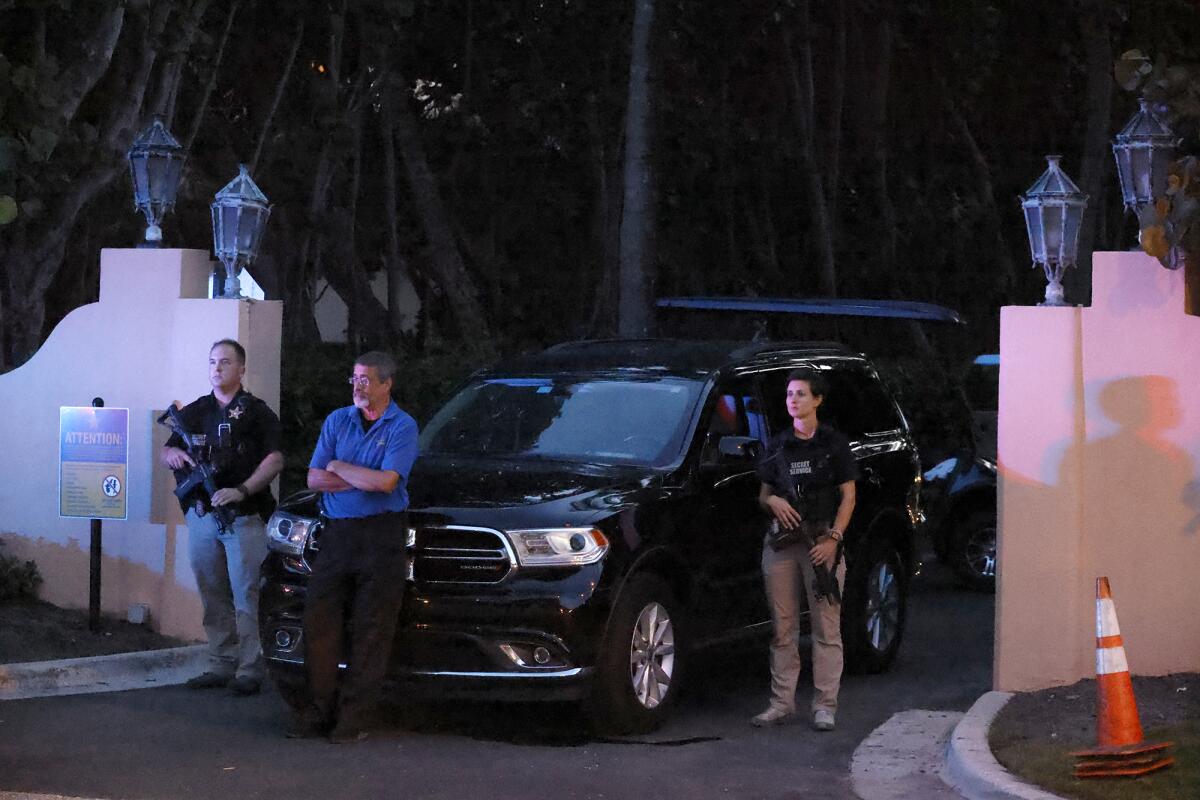FBI conducts ‘raid’ on Trump’s Mar-a-Lago estate, former president says

- Share via
WASHINGTON — Former President Trump said in a statement Monday that the FBI searched his Mar-a-Lago estate in Florida, in what he described as a “raid.”
It was not immediately clear why agents searched his Palm Beach home and what was removed, but Trump said the property was “under siege, raided, and occupied by a large group of FBI agents.” He added that the agents broke open his safe.
“After working and cooperating with the relevant government agencies, this unannounced raid on my home was not necessary or appropriate,” he said.
A large-scale search of a former president’s home by federal law enforcement is unparalleled in American history, and while Republicans quickly decried the move as the politicization of the Justice Department, it demonstrates an extraordinary level of potential legal trouble for Trump.
Executing a search requires the signoff of a federal judge, who issues a warrant based upon evidence of a potential crime. It is unlikely that such a high-profile warrant to search the personal residence of a former president would be sought without top Justice Department officials reviewing the evidence and approving the request.
Trump was not at his Palm Beach estate during the search but was in the New York City area, according to a person familiar with the situation. His son Eric Trump told Fox News that he was the person who notified his father of the search.
In his statement, Trump called the search an attempt to influence the midterm elections in November and compared it to the campaign of then-President Nixon trying to bug the Democratic National Committee during the Watergate scandal. Monday’s search took place 48 years to the day that Nixon announced his resignation in an attempt to avoid being removed from office because of the scandal.
Search warrants, which specify what federal agents are allowed to look for and seize, are generally not made public during an ongoing investigation, and may not ever be unless charges are brought as a result of the search.
Several former Trump administration officials have testified before a grand jury recently as part of the Justice Department investigation into the events around the Jan. 6, 2021, insurrection, but it was not immediately clear whether the search was connected to that or to other Trump-related investigations, including the potential destruction and removal of presidential records that took place when he left office.
Eric Trump told Fox News that the search warrant was related to materials taken from the White House that were supposed to go to the National Archives.
Earlier this year, the National Archives and Records Administration recovered 15 boxes of official records from Trump’s home at Mar-a-Lago, some of which were reportedly labeled classified or top secret, others of which were reportedly destroyed. At the time, Trump said he was cooperating with the department and dismissed it as routine. The agency, which is tasked with preserving the records for the public under the Presidential Records Act, also asked the Justice Department to determine whether charges were warranted.
“The scene was set for this kind of dramatic move when it became clear Trump had taken documents with him to Mar-a-Lago,” said Timothy A. Naftali, a presidential historian at New York University.
The potential punishment for improperly concealing or destroying presidential records under the Presidential Records Act is a fine, up to three years’ imprisonment and having to “forfeit his office and be disqualified from holding any office under the United States.” The Constitution sets the qualifications for being president, and the disqualification provision of the statute has not been tested in a case involving a president.
Trump has strongly indicated he will seek another term, with an announcement expected as soon as in the next few weeks.
The U.S. attorney’s office in Washington did not immediately respond to requests for comment. The U.S. attorney’s office in the Southern District of Florida and the FBI’s Miami field office declined to comment. Atty. Gen. Merrick Garland was appointed by President Biden and Trump appointed FBI Director Christopher A. Wray. A spokesman for the House committee investigating the Jan. 6 attack on the U.S. Capitol declined to comment.
The Jan. 6 committee’s investigation into Trump’s attempts to use fake electors to overturn the 2020 election and involvement in inciting the Capitol insurrection is ongoing, with hearings expected to resume in September.
The Justice Department has been tight-lipped about the target of its own ongoing investigation, though Garland has emphasized that no one will be above the law.
A White House official said on background that the administration was not informed of the search in advance. Biden has said little about the Jan. 6 hearings and has been careful not to comment about his predecessor’s potential legal liability, stating repeatedly that the Justice Department operates with complete independence.
In the short term, the news of Monday’s search amounted to an inconvenience for the White House, immediately overwhelming a news cycle that has focused in recent days on a string of political wins for Biden and Democrats, including a successful CIA mission that killed the leader of Al Qaeda, a surprisingly strong July jobs report last week and the Senate’s passage Sunday of a $700-billion package to combat climate change and lower prescription drug prices.
Julian E. Zelizer, a presidential historian at Princeton University, said Trump is correct in noting the unprecedented nature of the search, even if his analogy to Watergate is way off.
“It’s not a break-in. It’s the opposite,” he said. “This is a warranted search. It’s not like what Nixon did to the Democrats. If anything, it’s more akin to what might have happened to Nixon had he not been pardoned.”
The other unprecedented aspect of the federal investigation, Zelizer added, is Trump’s nascent but still unannounced bid to seek the presidency again in 2024.
“It’s not simply an ex-president who’s being investigated, but a potential nominee for 2024,” he said.
Trump’s staunchest allies condemned the FBI and accused the Justice Department of persecuting the former president.
House Minority Leader Kevin McCarthy (R-Bakersfield) promised to investigate the Justice Department if Republicans regain control of the House in November, warning Garland in a tweet to “preserve your documents and clear your calendar.”
GOP Rep. Marjorie Taylor Greene of Georgia put out a call to “defund” the FBI.
“This is the rogue behavior of communist countries, NOT the United States of America!!!” Greene said on Twitter.
Trump’s reaction to the raid comes as no surprise considering his past responses to a special counsel investigation, two impeachments and the other ongoing federal inquiries into his business dealings. He is no longer constitutionally immune to prosecution as a sitting president.
“He does not ever get attacked and not use the attack” for political gain, Zelizer said. “The question is: Does the evidence of what’s being found overwhelm his ability to capitalize politically?”
More to Read
Get the L.A. Times Politics newsletter
Deeply reported insights into legislation, politics and policy from Sacramento, Washington and beyond. In your inbox twice per week.
You may occasionally receive promotional content from the Los Angeles Times.













